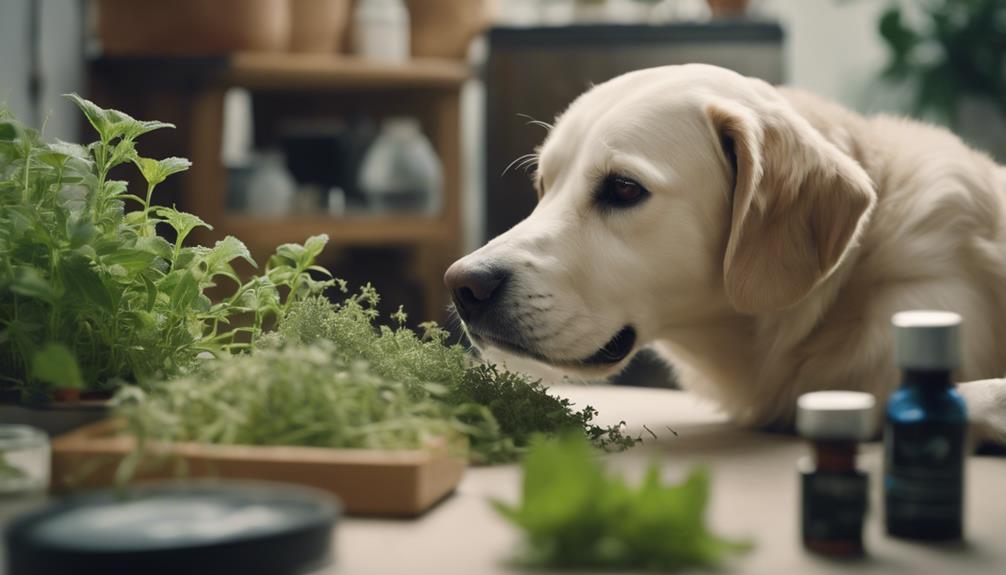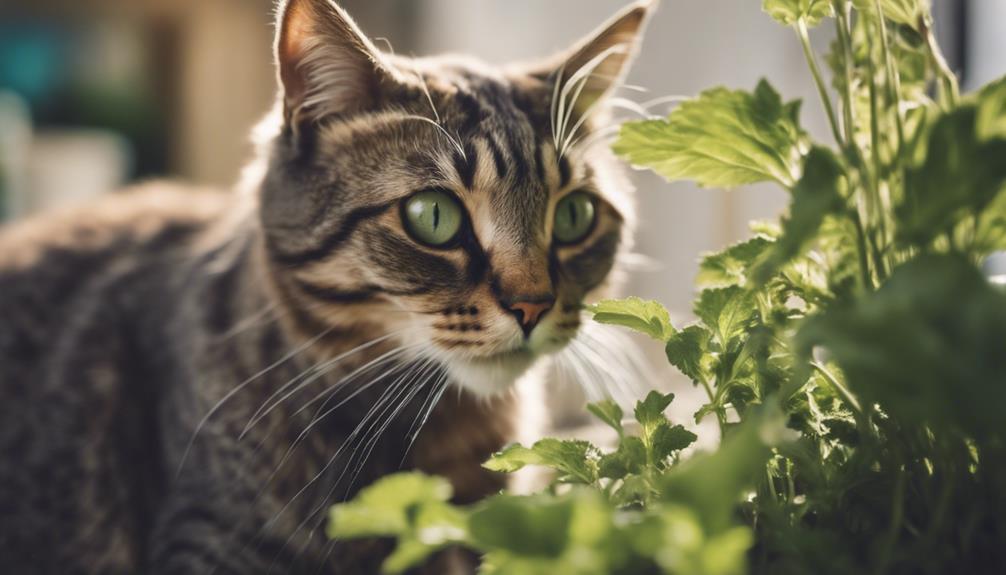When considering the safety of using catnip for dogs, it is crucial to understand the potential effects this herb may have on our canine companions.
While catnip is generally considered safe for dogs, there are nuances to its usage that pet owners should be aware of to ensure their pets' well-being.
Exploring how catnip interacts with dogs, its calming properties, and the precautions to be taken can provide valuable insights for those seeking holistic approaches to their pets' care.
By delving into the science behind catnip's effects on dogs, pet owners can make informed decisions regarding the use of this herb and its implications for their furry friends.
Key Takeaways
- Catnip is safe for dogs but has minimal effects compared to cats.
- Dogs may experience mild stomach upset if they ingest large amounts of catnip.
- Catnip can be used to help dogs with anxiety, sleep problems, or fear of travel.
- The essential oils in catnip could potentially make dogs feel unwell.
Safety of Catnip for Dogs
Although catnip is generally safe for dogs, it is important to be mindful of the potential mild stomach upset that may occur if ingested in large amounts. The essential oils in catnip could lead to discomfort for dogs, making it crucial to moderate their exposure.
While catnip is safe for dogs to be around, overconsumption may result in digestive issues. It is advisable to monitor the quantity of catnip given to dogs to prevent any adverse effects on their well-being.
Understanding the dosage appropriate for your dog's size and breed is essential in ensuring their safety when interacting with catnip. By being cautious and responsible in administering catnip, you can harness its potential benefits for your canine companion without causing any harm.
Attractiveness to Dogs
Catnip's appeal to dogs is often minimal due to their differing physiological response compared to cats. While catnip can induce a euphoric response in cats due to the compound nepetalactone binding to their vomeronasal organ, dogs do not exhibit the same reaction.
Dogs have vomeronasal organs like cats, but they lack the specific receptors that make catnip attractive to felines. This means that the majority of dogs do not show interest in catnip or its effects.
Therefore, if you offer catnip to your dog, do not be surprised if they show little to no interest in the herb. Understanding these differences in physiological responses is crucial when considering the use of catnip with dogs.
Potential Stomach Upset

Given the differing physiological responses of dogs compared to cats towards catnip, it is important to consider the potential for stomach upset in dogs when exposed to this herb. While catnip is generally safe for dogs, ingestion of large amounts may lead to mild stomach upset.
The essential oils present in catnip, although not as potent in catnip as they are in other herbs, can still have an effect on some dogs, potentially causing gastrointestinal disturbances. It is advisable to monitor your dog's reaction when introducing catnip for the first time, starting with small amounts to assess tolerance.
If you notice any signs of digestive discomfort such as vomiting, diarrhea, or excessive drooling, it is best to discontinue use and consult with a veterinarian.
Effects of Essential Oils
The impact of essential oils on dogs, particularly when derived from catnip, warrants careful consideration due to the potential physiological effects they may induce. Essential oils are concentrated plant extracts that can have various effects on animals, including dogs. When it comes to catnip essential oil, it is essential to understand its potential impact on dogs' well-being.
| Effect of Essential Oils | Description |
|---|---|
| Skin Irritation | Essential oils can cause skin irritation if applied directly or in high concentration. |
| Respiratory Distress | Inhalation of certain essential oils may lead to respiratory issues in dogs. |
| Gastrointestinal Upset | Ingestion of some essential oils can result in stomach upset or more severe gastrointestinal problems. |
| Neurological Effects | Certain essential oils have the potential to affect the nervous system of dogs, leading to various neurological symptoms. |
General Safety Around Dogs

When considering the safety of essential oils around dogs, it is crucial to maintain general safety practices to ensure the well-being of our canine companions. Here are some key safety tips to keep in mind:
- Dilution: Always dilute essential oils before using them around dogs to prevent skin irritation or toxicity.
- Avoid Certain Oils: Some essential oils like tea tree, citrus, and pine can be toxic to dogs and should be avoided.
- Proper Storage: Store essential oils out of reach of pets to prevent accidental ingestion or exposure.
Catnip's Active Ingredient
Revealing its unique properties, the active ingredient in catnip, nepetalactone, interacts with specific receptors in felines, leading to distinct behavioral responses. Nepetalactone is a natural compound found in catnip that triggers a response in cats when they come into contact with it. This compound binds to the receptors in a cat's vomeronasal organ, influencing behaviors such as rolling, rubbing, and increased vocalization.
While catnip affects cats significantly, dogs do not respond to nepetalactone in the same way. Even though dogs possess vomeronasal organs like cats, they lack the sensitivity to catnip's active ingredient, resulting in a lack of behavioral changes commonly seen in felines. Understanding the role of nepetalactone in catnip helps clarify why cats exhibit unique reactions to this herb.
Cats' Reaction to Nepetalactone

Understanding the unique behavioral responses of cats to nepetalactone sheds light on the intriguing reactions elicited by catnip in felines. Cats display various reactions when exposed to nepetalactone, the active ingredient in catnip, including:
- Excitement: Cats may exhibit playful behaviors, such as rolling, rubbing, and jumping, when exposed to nepetalactone.
- Calming Effect: In some cases, catnip can also have a calming effect on cats, inducing a sense of relaxation and contentment.
- Individual Variability: Not all cats respond to nepetalactone; approximately 50-80% of cats are affected by this compound, with kittens and senior cats being less responsive.
Nepetalactone's Binding Site
Nepetalactone binds specifically to a receptor in the vomeronasal organ of cats, triggering unique behavioral responses in felines when exposed to catnip. The vomeronasal organ, also known as Jacobson's organ, is located in the roof of the cat's mouth and is responsible for detecting pheromones.
When nepetalactone comes into contact with this organ, it elicits behaviors such as rolling, rubbing, and increased vocalization in cats. This compound acts as a stimulant, causing a temporary euphoric state in susceptible cats.
However, dogs, while also possessing a vomeronasal organ, do not exhibit the same responses to catnip due to differences in their sensory receptors and brain pathways.
Dog's Response to Catnip

When exposed to catnip, dogs typically exhibit minimal to no response due to differences in their sensory receptors and brain pathways compared to cats. Unlike cats, dogs do not respond to catnip in the same way due to variations in their biology. Here are some key reasons why dogs do not react to catnip like cats do:
- Sensory Receptors: Dogs lack specific sensory receptors that are necessary to detect and respond to the active compound in catnip, nepetalactone.
- Brain Pathways: The brain pathways in dogs do not process nepetalactone in the same manner as in cats, leading to a lack of behavioral response.
- Vomeronasal Organ: While dogs possess a vomeronasal organ like cats, it does not elicit the same reaction to catnip.
Catnip's Effects on Dogs
Catnip has minimal impact on dogs due to their lack of sensitivity to the active compound nepetalactone, resulting in limited behavioral responses compared to cats. Unlike cats, where approximately 50-80% react to nepetalactone due to its binding to the vomeronasal organ, dogs do not exhibit the same reactions. While dogs also possess vomeronasal organs, they do not respond to catnip in the same way.
Thus, the effects of catnip on dogs are generally mild or nonexistent. This lack of response makes catnip a safe herb to be around for dogs, as it is unlikely to cause significant changes in behavior or health issues.
Calming Effects on Dogs

The potential calming effects of catnip on dogs have been a subject of interest in holistic veterinary care. While catnip is more renowned for its impact on cats, some dogs may also benefit from its calming properties.
- Reduction in Anxiety: Catnip may help alleviate anxiety in dogs, promoting a sense of calmness and relaxation.
- Improved Sleep: The sedative properties of catnip could aid in improving a dog's sleep quality, leading to a more restful night.
- Stress Relief: Catnip might assist in reducing stress levels in dogs, making it a potential tool for managing stressful situations such as travel or separation anxiety.
Use in Holistic Care
Incorporating catnip into holistic veterinary care showcases its potential benefits beyond its traditional association with cats, offering a natural remedy for promoting relaxation and well-being in dogs. Catnip, known for its calming effects, can be a valuable tool in managing anxiety, sleep issues, and fear of travel in dogs. This herb, rich in vitamins A and E, as well as magnesium, can be administered to dogs in various forms such as capsules or sprinkled over food. The use of catnip in holistic care aligns with the trend towards natural remedies and complements traditional veterinary treatments. Below is a table illustrating the potential benefits of incorporating catnip into dogs' holistic care:
| Benefit | Description | Example |
|---|---|---|
| Calming Effects | Helps reduce anxiety and promote relaxation | Eases fear of thunderstorms |
| Sleep Aid | Assists in improving sleep quality | Helps with insomnia |
| Stress Relief | Aids in stress management | Reduces travel anxiety |
Nutritional Benefits of Catnip

When considering the nutritional benefits of catnip for dogs, it is essential to acknowledge its potential to enhance overall wellness. Catnip offers more than just its enticing effects on cats; it can also provide valuable nutrients for dogs.
Here are three nutritional benefits of catnip for dogs:
- Vitamin A: Catnip contains vitamin A, which is essential for maintaining healthy vision, skin, and coat.
- Vitamin E: Another important nutrient found in catnip is vitamin E, known for its antioxidant properties that help protect cells from damage.
- Magnesium: Catnip is a good source of magnesium, a mineral that supports various bodily functions such as muscle and nerve function, as well as bone health.
Including catnip in your dog's diet can contribute to their overall health and well-being.
Administration Methods for Dogs
Administering catnip to dogs can be done through various effective methods to provide potential benefits for their well-being.
One common method is giving catnip to dogs in capsule form, which can be easily administered with their regular meals. The capsules can be opened and the catnip sprinkled over the food to ensure consumption.
Another way to administer catnip to dogs is by using catnip-infused toys or treats. These products are designed to release the scent of catnip, potentially providing a calming effect for dogs.
Additionally, catnip sprays are available, allowing pet owners to apply the herb to their dog's bedding or toys.
These different administration methods offer flexibility in how catnip can be introduced to dogs for potential health benefits.
Conclusion
In conclusion, catnip can be safe for dogs when used properly, but precautions should be taken to prevent potential stomach upset.
The herb's calming effects can be beneficial in holistic veterinary care, and its nutritional benefits can support dogs' overall health.
Understanding the effects of catnip on dogs and implementing appropriate administration methods can help pet owners make informed decisions for their furry companions' well-being.




